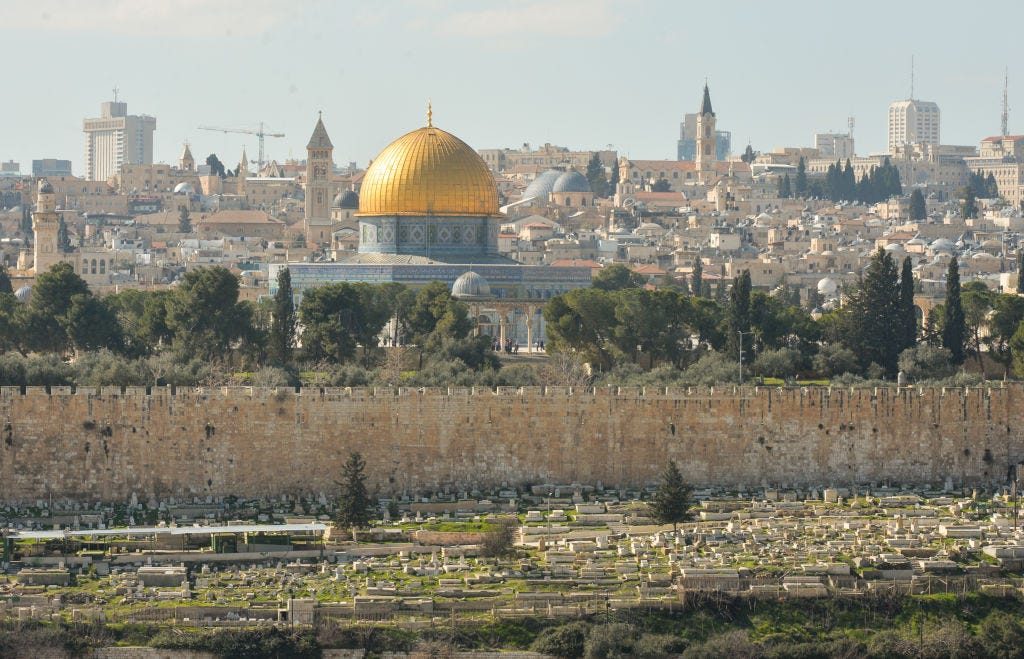The Colonizer-Indigenous Rhetoric Only Divides
This rhetorical war over which ethnic group maintains authentic ownership of the area between the Mediterranean Sea and the Jordan River only makes peace more difficult.
This commentary is a collaboration with Unherd.
Moments after the first images of the Hamas terror attack on October 7 hit the web, people on the Left started to cheer on the brutal assault as an act of “decolonizing” Israel. “What did y’all think decolonization meant?” tweeted one Minnesota-based writer. The massacre of participants at a rave represented a “consequence” for “partying on stolen land,” added a British academic. In the month since, demonstrations across the world have echoed this rhetoric, justifying Hamas’s gruesome actions under the banner of overthrowing the yoke of “settler-colonial” rule.
More than anything, this perspective reflects the common Leftist belief that Palestinians are the true native people of the land, but were dispossessed of their territory by an invading army of white Europeans.
The sudden outburst of anti-colonial rancour, which glorified the slaying of children and innocent civilians, triggered a wave of condemnation, with some pointing out that Jews are also indigenous to the region. “The Jewish people ruled Judean kingdoms and prayed in the Jerusalem Temple for 1,000 years,” observed Simon Sebag Montefiore in The Atlantic. Jews, wrote Rich Lowry in The New York Post, “are fundamentally identified with the land,” making them an “indigenous people.”
Some in Israel take the argument a step further, however. “When Palestinians were climbing trees, we already had a Jewish state,” Naftali Bennett, a former prime minister, argued in a debate with an Arab politician, who had chastised him as a “settler” and a “tumour” that needed to be removed. “There’s no such thing as Palestinians,” declared Israeli Finance Minister Bezalel Smotrich, who claimed that David Ben-Gurion should have “finished the job” and forced out every Arab when the country was founded.
This rhetorical war over which ethnic group maintains authentic and historical ownership of the area between the Mediterranean Sea and the Jordan River speaks to the emotional power of the “indigenous” mantle. In this framework, the justice of a particular cause is determined primarily by whether the people advocating for it are more authentically native. And as a phenomenon, it extends well beyond this conflict, rippling through Western society in recent years. In Europe, for instance, far-Right movements have spent the past decade calling for immigrants to be expelled in order to preserve the racially pure heritage of Europe’s “indigenous” communities. In America, meanwhile, Leftists now demand “land acknowledgment” rituals, which suggest that the US is merely a racist power occupying what should be sovereign tribal territory. During the deadly riots of 2020, activists celebrated the violence as an effort to “decolonize” the country.
Long before October 7, similar disputes defined the politics that shaped relations between Palestinians and Jews. The process, in many respects, is deeply institutionalized.
Last year, I reported from Israel and Palestine, and visited a number of neighborhoods in East Jerusalem, the largely Palestinian side of the city seized by the Israeli military during the 1967 war. Unlike the West Bank, Israel formally annexed East Jerusalem in 1980, granting Palestinians there permanent residency in Israel, but not Israeli citizenship.
The area is home to the City of David complex — part-museum, part-archeological dig, and part-propaganda apparatus for a project that seeks to exert Jewish claims of indigeneity across all of Jerusalem. The neighborhoods are like a slow-simmering warzone. Homes are surrounded by razor wire and iron gates. Evictions of Palestinians are celebrated with banners announcing the arrival of Jewish families. The situation is tense.



